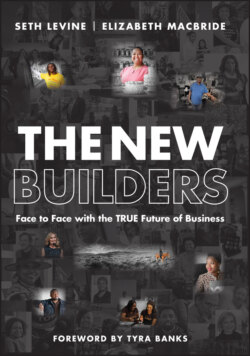Читать книгу The New Builders - Seth Levine - Страница 16
Choosing What to See
ОглавлениеYou've probably never heard of Elizabeth Keckley. Born an enslaved person in 1818 in Virginia, she learned a skill, dressmaking, which her White owners used to help support their families. As is the case with many women – especially Black women – the value of her work was not her own. Through sheer grit and determination, she scraped together $1,200 (roughly $35,000 in today's currency) and purchased her freedom. In 1860, she made her way with her son to Washington, DC, where she met and befriended Mary Todd Lincoln, becoming her personal modiste. She eventually chronicled their close friendship in her book, Behind the Scenes: Or, Thirty Years a Slave and Four Years in the White House, a remarkable history of her escape from slavery and her time inside the highest echelons of American political society.
Hers is an almost unbelievable account of the power of the entrepreneurial spirit to change one's life and a testament to the determination required to succeed. It's also a reminder – and something we'll explore over and over as we meet more New Builders – of the power of network and mentorship. It's a story of promise and a beacon to this day for the power of American entrepreneurship. But it's also a reminder that New Builders and their predecessors have been fighting for hundreds of years for recognition and support in our entrepreneurial landscape. One of the reasons we don't value Danaris Mazara is that we haven't valued Elizabeth Keckley. Former US Secretary of State Condoleezza Rice – the first Black woman to hold that position – described this fight for universal dignity and respect that many dominant communities take for granted, but that others are in a constant struggle for, in a commencement address to the College of William & Mary in 2015:
I grew up in Birmingham, Alabama, the Birmingham of Bull Connor and the Ku Klux Klan and church bombings, a place that was once quite properly described as the most segregated big city in America. I know how it feels to hold aspirations when your neighbors think that you are incapable or uninterested in anything higher…We have not and will not quickly erase the lasting impact of our birth defect of slavery, or the follow‐on challenge of overcoming prejudices about one another (emphasis added). 10
Rice reminds us that our past is something that we can't, and shouldn't, simply forget or tuck away in some dark corner. At the same time, our history does not need to define us.
As in every other sphere of American life, racism and misogyny are critical parts of the story. Too many women and entrepreneurs of color have been written out of our entrepreneurial history – from the earliest days of our country to the present day. Immigrants played, and continue to play, a critical role in building America's entrepreneurial identity. The truth is that the entrepreneurial fabric of our country has always relied on women, people of color, and immigrants. They built great businesses and helped develop the diverse Main Streets that flourished throughout much of our history as a nation. To see the potential of present‐day New Builders, we need to understand how easy it has been to discount entrepreneurs who don't fit the prevailing model. Because now, more than ever, we need to recognize the role these diverse business owners play in our economy and change how we support and enable them. Our economy has always relied on the success of small businesses, some of which grow and others that stay small. But we're quickly losing sight of that and, in so doing, jeopardize not just our economy but along with it our national identity.
To understand how we got to this place, where we've nearly abandoned the people who are our best hope for building a better future, we need to start with a short trip into the past, on the shoulders of that too long, too complicated, and now seemingly co‐opted word: entrepreneur. We need to understand how, in the late twentieth century, Silicon Valley and the tech world became, first, the gold standard, and then the only standard that mattered for entrepreneurship. And we need to understand that our love affair with size is causing us to forget the power of small. We've also lost sight of one of the most inexorable rules of money: it will flow along the path of least resistance and highest return, which is often to the people who already have it.
